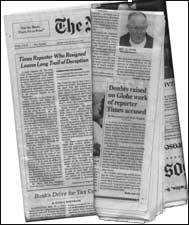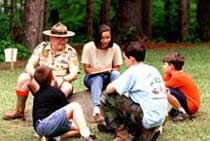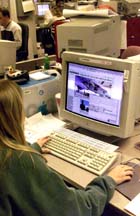| (insert your NIE or newspaper logo here) |
Weekly Online LessonOnline Lesson ArchiveGrade Level: 8-12
|
Journalism's Job: Accuracy & Honesty in the News
 May
2003 has been a tough month for The New York Times, one of
the nation's leading daily newspapers.
May
2003 has been a tough month for The New York Times, one of
the nation's leading daily newspapers.
Earlier this month, their staff reporter Jayson Blair was publicly pegged as a liar and a thief. Investigators have so far found evidence of fraud, plagiarism and errors in 36 of 73 articles written by him between October and April.
And just last week, on Friday, May 23, the Times reportedly suspended their national correspondent Rick Bragg, a Pulitzer Prize winner, for two weeks. In the Editors' Note printed with the Corrections that day, the newspaper stated that a feature story, published nearly a year ago about Florida oystermen, had been solely credited to Bragg. Instead, the Times should have also credited freelance journalist J. Wes Yoder, who did much of the field reporting for the story.
Although Yoder, interviewed by the Columbia Journalism Review, believes he and Bragg did nothing unethical and that the story was accurate, the Times is clearly nervous about anything that might erode its reputation as a trustworthy news source.
But The New York Times isn't alone in occasionally uncovering gaps in accuracy or breaches in ethics among their ranks. And every incident potentially undermines the integrity and credibility of the journalism profession. Think about it: If a newspaper -- knowingly or unknowingly -- publishes fiction as fact, then how can the public trust that what they read every day is truthful and accurate?
 Reporting
the news honestly and fairly is an important job, and it's also a difficult
one. Reporters must research a subject or issue, interview people, pay
close attention to detail, and write an interesting and balanced story
-- often while working on a tight deadline and juggling several other
stories at once.
Reporting
the news honestly and fairly is an important job, and it's also a difficult
one. Reporters must research a subject or issue, interview people, pay
close attention to detail, and write an interesting and balanced story
-- often while working on a tight deadline and juggling several other
stories at once.
Unfortunately, errors sometimes get published in the process, whether it's because a reporter blatantly lies or because an editor doesn't question or double check all the facts. Sometimes a typo simply gets overlooked.
In this week's lesson, you'll travel with a cyberjournalist to find out how news stories can, and have, twisted the truth. You'll also explore the history and duty of news reporting, so you can investigate what it takes to crank out accuracy and honesty in newspaper form every day.
Getting It Right
 Start
of by joining The
Adventures of Chip Tracer, a comic book-style story at
the Newseum.
Start
of by joining The
Adventures of Chip Tracer, a comic book-style story at
the Newseum.
Dive into Episode 1: Wright or Wrong?, and either Play Movie, if you have the Shockwave Player, or enter the HTML Version.
As Chip leads you through her investigation of the first flight of the Wright Brothers, make sure to click NEXT on the screen panel or on the time-travel buttons of her armband.
How did people's personal viewpoints and professional judgments along the way preserve or replace the "truth" -- from the Wrights' carefully prepared news release to the story printed by the newspaper?
Similarly check out Episode 2: Casualty of War and uncover the battle of Little Big Horn.
Why is it important for reporters to conduct independent investigations into issues rather than rely on reports or opinions of others? In what ways should reporters be objective when explaining news to the public? What are some of the values in visiting the places and talking to the people that the news or issues affect most?
Reporting the News: A Team Effort
 So
what obligations does the news media have to its readers, and possibly
to society as a whole?
So
what obligations does the news media have to its readers, and possibly
to society as a whole?
Begin your training as a news reporter with Journalism 101 at the Dayton Daily News. Start with the History of Journalism chapter, then learn the Principles of Journalism.
What is the difference between the "truth" and the "facts"? Why are the journalistic principles important -- individually and as a synergistic group? Why do you think "courage" is listed as an important tool?
Also learn about the Anatomy of a Newspaper, News Writing, News Photography and Editing and Layout.
How do reporters and editors decide what's "news"? How do the many different departments and jobs at a newspaper work together to publish on a routine deadline? Which jobs relate to telling the news accurately, whether using words or graphics? In what ways do those staff members interact or communicate? What could happen if a staffer doesn't do his job well?
Try composing a list ranking which components of a newspaper are most important to you, including design, storytelling, the balance of facts and quotes, accuracy, etc. Compare your list to that of someone else. Do any of your rankings match? Which did you rank differently? Discuss your reasoning with each other.
Newspaper Activities
Now that you've learned the basics, hit the beat as an investigative reporter. Get started by browsing a current issue of Targetnewspaper and choose one or more articles written by the newsroom's staff (not by a wire service, like The Associated Press or Reuters). Go through the story line by line and circle each "fact," such as a person's job title, a company's name, a specific law, a scientific term or a medical condition. Check each fact for yourself, using online resources (try Power Reporting for help Beat by Beat) or using your library, telephone book, face-to-face interviews, etc. Did you find evidence that any of the news story's facts were inaccurate? What percentage of the facts were correct?
Also, check your newspaper's Correction box periodically. How often do they print corrections? What kinds of errors seem routine? Which ones could undermine the newsroom's credibility the most and how often do those seem to happen? How accurate, fair and honest do you think your local newspaper is? What exactly does the newspaper do (or not do) that influences your opinion of it?
© Copyright 2002
Learners Online, Inc.
